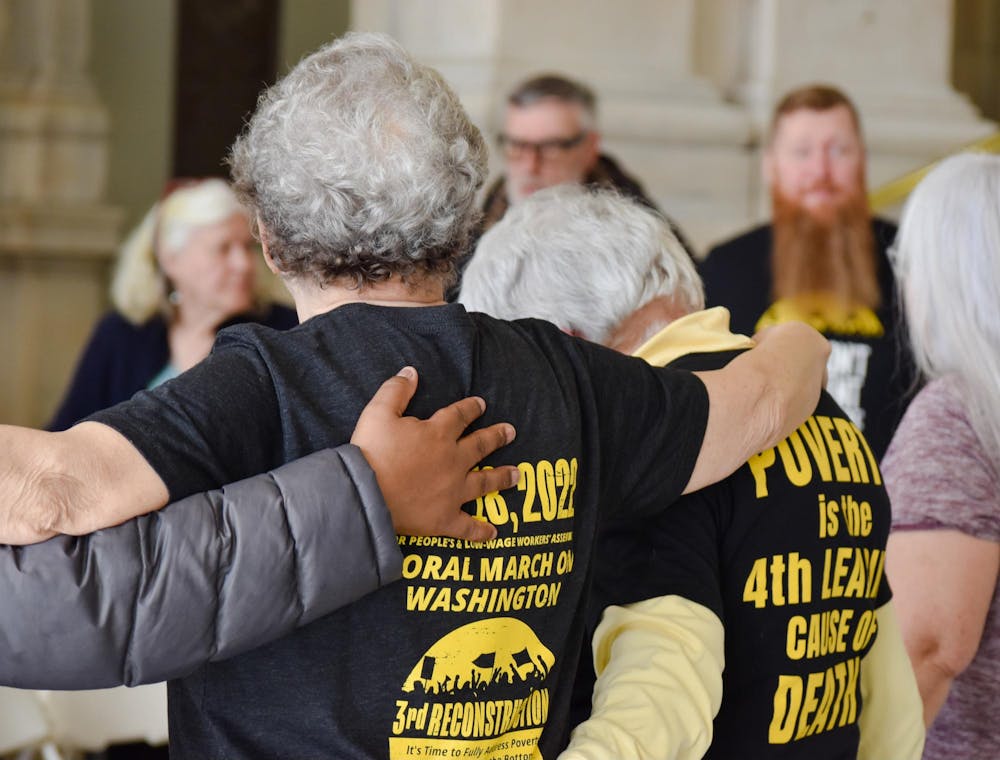On March 2, roughly 200 people gathered with the Rhode Island Poor People’s Campaign “to launch a 40-week effort to mobilize poor and low-wage voters in Rhode Island,” and to “demand legislators take immediate action to end the crisis of death by poverty in the United States,” according to a press release by the group. The demonstration was one of over 30 that took place in state capitals across the country.
At the demonstration, members of the group — which includes low-income voters, faith leaders and social justice advocates — held a funeral march downtown and carried coffins adorned with posters that featured statistics about state and national poverty levels, Indigenous loss of ancestral land, voter suppression and the impact of the climate crisis on low-income people.
“The fourth leading cause of death is poverty,” Carl Jefferson, one of the chairs of the RI Poor People’s Campaign, told the crowd gathered at the statehouse. He later led the group in a moment of silence to mourn those who had died and will die from poverty.
Speakers at Saturday’s assembly addressed issues such as immigration reform, reduced life expectancy associated with low-incomes and the underfunding of RI schools. Attendees also emphasized low-income families’ struggles to meet basic needs and the link between poverty and incarceration. Speakers also advocated for the redistribution of funds from military spending to social spending programs such as affordable housing.
Daisy Paz, who attended the event on behalf of the George Wiley Center, told the audience to support “the legislation … in your community that (is) being proposed that will impact those of us who are poor. Besides coming here today, please also take a moment to take action.” Many advocates also referenced the idea of ‘waking the sleeping giant’ and the voting power of engaging low-income voters.
On March 4, the campaign organized a second demonstration. About 20 members of the campaign gathered at the Rhode Island State House to deliver their demands to legislators. The group left some packets in mailboxes and delivered others to office personnel. They were assisted by Representative Cherie Cruz (D-Pawtucket) in their efforts.
The letter delivered to legislators on Monday included demands to abolish poverty, increase the minimum wage to at least $15, expand voter rights and end voter suppression, guarantee workers’ rights and labor rights, fund healthcare for all, provide affordable and adequate housing, end gun violence, protect women’s rights, promote environmental justice, fully fund public education, create just immigration laws and end extremism.
In 2021, the National Poor People’s Campaign introduced House Resolution 438, which aims to “fully (address) poverty and low wages from the bottom up.” The bill is aligned with the organization’s Third Reconstruction plan, which is a detailed agenda of the organization’s demands.
Organizer Peter Nightingale shared that while the organization has not solidified its plans for voter outreach, they previously targeted low-income people through text campaigns during the 2020 and 2022 elections.
“We did a lot of texting — 30,000, 40,000 texts in the last weeks before the election — to get people out to vote and to express themselves and say what is being done is not meeting our needs,” he explained.
Several advocates, including Paz, spoke about the importance of passing the Percentage of Income Payment Plan (H.B. 5809) to combat poverty. “Right now, Rhode Islanders of the low-income community, we’re paying almost half of our paychecks to bills,” Paz said.“Under PIPP, we would be paying only 3-6%.”
According to the press release, partners of the Rhode Island Poor People’s campaign include organizations such as East Bay Citizens for Peace, the George Wiley Center and the Rhode Island Homeless Advocacy Project, among others.
Joe Monteiro, who has been involved with the campaign since 2018, said that unlike many advocacy organizations, the group is collaborative and does not isolate itself from other stakeholders.
“We like to think of ourselves as co-dependents … for instance, if you’re a climate justice person and you need to get the word out, then the poverty people need to step in and assist you,” he explained.
Mikayla Kennedy is a Metro editor covering housing and transportation. They are a junior from New York City studying Political Science and Public Policy Economics.





